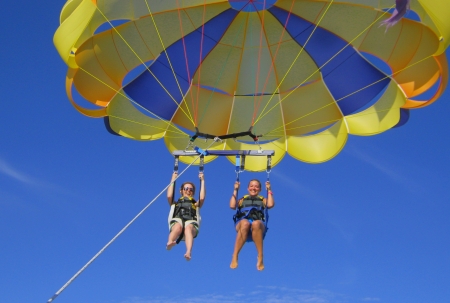In light of the latest parasailing tragedy that took place two days ago in Pompano Beach, a new push for safety regulations of the parasailing industry is to be expected and encouraged by all, especially Floridians who have become the forced audience of so many fatal accidents, all of which preventable.
When Ira Leesfield represented the White family, in 2007, after the death of Amber and the catastrophic brain injury to Crystal, her sister, Leesfield & Partners engaged in a national awareness campaign which included appearances on the Today Show, and Inside Edition. The goal was not only to bring attention to the dangers associated with parasailing when precautions are not taken (they almost never are), but also and most importantly to push legislators in Florida and in other coastal states to pass laws and safety regulations at once. Two drafts of the Amber May White Act were introduced before the Florida legislators in 2007 and 2008, but both failed.
The death of Kathleen Miskell, a 28-year-old woman from Wethersfield, Connecticut, will once more sound the alarm to all who want to hear it. The self-imposed safety measures that the parasailing industry claims to be following are insufficient, inadequate and simply intolerable. On a daily basis, these unregulated businesses, often manned by incompetent and inexperienced individuals, place their customers in danger. The equipment used for parasailing is never inspected, the ropes used to tug the chute with one, or two, sometimes even three people, are improper and overused. Companies often use the same chute regardless of the weight or the number of people they are sending up hundreds of feet in the air. Yet, there is no accountability. Ira Leesfield reiterated his concerns to the Miami Herald, concerns that grow stronger with each and every parasailing victim Leesfield & Partners represents.
 The Florida Fish and Wildlife Conservation Commission is leading the investigation in the death of Kathleen Miskell, and the piece of equipment that has come under scrutiny is the harness. Thus far, we know that the harness used by Waveblast Watersports, Inc., the parasailing company Kathleen and Stephen Miskell trusted with their lives, failed. The harness in question attached Kathleen to the horizontal bar which was connected to the sail of the chute.
The Florida Fish and Wildlife Conservation Commission is leading the investigation in the death of Kathleen Miskell, and the piece of equipment that has come under scrutiny is the harness. Thus far, we know that the harness used by Waveblast Watersports, Inc., the parasailing company Kathleen and Stephen Miskell trusted with their lives, failed. The harness in question attached Kathleen to the horizontal bar which was connected to the sail of the chute.
The investigation will answer the most crucial questions: Why did the harness fail? Could a simple visual inspection have revealed the cause for the harness to fail? When was the last time Waveblast Watersports inspected the harness, if ever? When was the last time the harness was used? Depending on what FWC finds, new questions could be asked of the harness’ manufacturer.
Read our previous stories on the Kathleen Miskell tragedy:
Latest Pompano Beach parasailing incident results in the death of Kathleen Miskell
License of boat captain involved in parasailing death and brain injury of tandem passengers revoked
That being said, no waiting is needed for the conclusion of the investigation to reveal what Leesfield & Partners already knows. The only regulations parasailing businesses must follow are not safety-oriented, and fail to lay any consequence for their violations. Florida Statute §327.37 – Water skis, parasails, and aquaplanes regulated – imposes the following:
– Two persons must be on the boat when parasailing – The boat operator and a mate.
– The vessel must be equipped with a rear-view mirror allowing the boat operator to keep an eye on the chute.
– A parasailing ride can only be performed 30 minutes after sunrise until 30 minutes before sunset.
– A parasailing ride must equip its customers with a personal flotation device.
Florida law is clearly insufficient and carries no penalty if violated. Even worse, the local, state, or federal authorities have no jurisdiction to conduct any inspections on those vessels. As a result, owners and operators of these parasailing businesses are not deterred by the law to show any due-diligence. On the contrary, shortcuts are taken at every level of the industry, in order to maximize profit margins, to the detriment of safety.
The parasailing industry needs strict regulations, standard equipment requirements, and be submitted to regular and surprise inspections. Short of that, we will be mourning the needless loss of many more individuals for years to come.
 Florida Injury Lawyer Blawg
Florida Injury Lawyer Blawg


